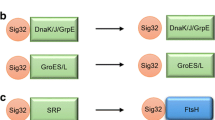Abstract
We have characterized the heat-shock response of the nosocomial pathogen Enterococcus faecium. The growth of E. faecium cells was analyzed at different temperatures; little growth was observed at 50°C, and no growth at 52°C or 55°C. In agreement, a marked decrease of general protein synthesis was observed at 52°C, and very light synthesis was detected at 55°C. The heat resistance of E. faecium cells was analyzed by measuring the survival at temperatures higher than 52°C and, after 2 h of incubation, viable cells were still observed at 70°C. By Western blot analysis, two heat-induced proteins were identified as GroEL (65 kDa) and DnaK (75 kDa). Only one isoform for either GroEL or DnaK was found. The gene expression of these heat-shock proteins was also analyzed by pulsed-labeled experiments. The heat-induced proteins showed an increased rate of synthesis during the first 5 min, reaching the highest level of induction after 10 min and returning to the steady-state level after 20 min of heat treatment.
Similar content being viewed by others
Author information
Authors and Affiliations
Additional information
Received: 29 March 2002 / Accepted: 5 July 2002
Rights and permissions
About this article
Cite this article
Laport, M., da Silva, M., Silva, C. et al. Heat-Resistance and Heat-Shock Response in the Nosocomial Pathogen Enterococcus faecium . Curr Microbiol 46, 0313–0317 (2003). https://doi.org/10.1007/s00284-002-3828-0
Issue Date:
DOI: https://doi.org/10.1007/s00284-002-3828-0




